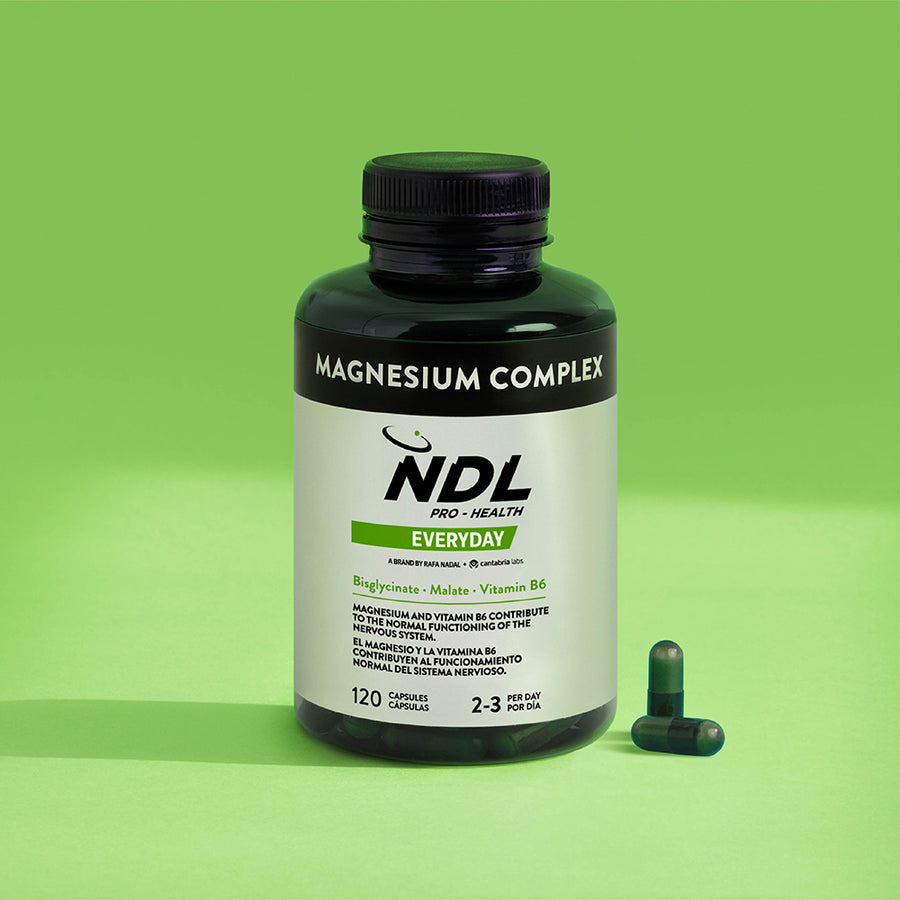Featured Products

Triple Magnesium
See productMagnesium, often called the "miracle mineral," is an essential nutrient that plays a crucial role in over 300 biochemical functions in the human body. From supporting proper muscle and nerve function to regulating blood sugar levels and blood pressure, this mineral is indispensable for overall health.
In this article, we’ll focus on how magnesium specifically impacts women’s health. Throughout the different stages of a woman’s life — from adolescence to menopause — magnesium plays a key role in hormonal balance, stress reduction, and managing menstrual cycle symptoms.
Our goal is to highlight the most important benefits of magnesium for women and offer practical tips to help ensure adequate daily intake.
Why is magnesium essential for women?
As mentioned, magnesium is one of the most important minerals for the proper functioning of the human body, but its relevance becomes even more significant when we talk about women’s health. From hormonal processes to emotional balance and physical wellbeing, this mineral plays a vital role in key functions that directly impact women's quality of life.
During different life stages — adolescence, pregnancy, motherhood, and menopause — the female body undergoes significant changes that require an adequate intake of essential nutrients. Magnesium not only supports basic functions like energy production and protein synthesis, but it also contributes to bone health, hormonal balance, and nervous system regulation.
In a world where stress, fatigue, and poor dietary habits are increasingly common, ensuring adequate magnesium intake can make a significant difference in women’s overall wellbeing. Understanding its importance is the first step to reaping its many benefits and making informed decisions about daily nutrition.
Main benefits of magnesium for women
Here are the key benefits of magnesium for women:
- Relieves PMS symptoms: Magnesium helps reduce common premenstrual syndrome (PMS) symptoms like cramps, irritability, bloating, and mood swings. It also helps regulate hormone levels, providing natural relief during this phase of the cycle.
- Supports bone health: Women are more prone to osteoporosis, especially after menopause. Along with calcium and vitamin D, magnesium plays a vital role in building and maintaining strong bones, helping to prevent bone density loss.
- Reduces stress and improves mood: Magnesium helps regulate the nervous system by lowering cortisol (the stress hormone) and supporting serotonin production, known as the “happiness hormone.” This helps reduce anxiety and stress, improving emotional wellbeing.
- Improves sleep quality: This mineral promotes muscle and nerve relaxation, making it easier to fall asleep and enjoy restorative rest. It also helps reduce insomnia, which is common during hormonal shifts.
- Supports cardiovascular health: Magnesium is essential for maintaining a healthy heart rhythm, regulating blood pressure, and reducing the risk of cardiovascular disease. This is especially important after menopause when cardiovascular risk increases.
- Boosts energy and reduces fatigue: Magnesium is essential for cellular energy production. Adequate levels help combat chronic fatigue, improve physical performance, and reduce feelings of exhaustion.
In short, magnesium is not only a powerful ally for women’s health, but also a key nutrient for navigating life’s physical and emotional challenges with energy and balance.
Key life stages when magnesium is essential for women
There are specific moments when magnesium intake is especially important for women’s health and wellbeing:
- Adolescence: During adolescence, the body undergoes major hormonal and physical changes. Magnesium helps balance hormones, relieve menstrual cramps, and reduce stress and anxiety, which are common in this stage. It is also essential for proper bone development, laying the foundation for the future.
- Reproductive years and menstrual cycle: During childbearing years, magnesium helps ease PMS symptoms, regulate the menstrual cycle, and reduce fatigue experienced during menstruation.
- Pregnancy: Magnesium requirements increase significantly during pregnancy, as it is essential for fetal development, tissue formation, and preventing complications such as preeclampsia. It also helps reduce muscle cramps and promotes restful sleep during this period.
- Breastfeeding: During lactation, magnesium remains essential for both mother and baby. It supports postpartum recovery, reduces fatigue, and helps with milk production. Adequate magnesium levels also help manage stress and sleep deprivation common in this phase.
- Menopause: During menopause, hormonal fluctuations and the risk of bone density loss increase. Magnesium, along with calcium and vitamin D, helps preserve bone health and reduce the risk of osteoporosis. It also alleviates symptoms such as hot flashes, insomnia, and mood swings.
- Older age: In later life, magnesium is vital for maintaining bone density, reducing fracture risk, and supporting a healthy cardiovascular system. It also helps combat fatigue, improve sleep quality, and maintain cognitive function.
Each of these life stages presents unique challenges, and magnesium becomes a fundamental ally for navigating them with strength, energy, and balance. Ensuring adequate intake throughout life is key to enjoying better quality of life at every stage.

Natural sources of magnesium for women
The best way to get magnesium is through a balanced diet. Some of the top sources include:
- Nuts and seeds: Almonds, cashews, walnuts, pumpkin seeds, and chia seeds are excellent sources of magnesium. They also provide healthy fats and energy.
- Leafy green vegetables: Greens like spinach, Swiss chard, kale, and broccoli contain high levels of magnesium thanks to their chlorophyll content.
- Whole grains: Brown rice, oats, quinoa, and buckwheat are nutritious grains that provide magnesium, fiber, and other essential minerals.
- Legumes: Lentils, chickpeas, black beans, and edamame are tasty, affordable, and rich in magnesium and plant-based proteins.
- Fresh and dried fruits: Fruits like avocado, bananas, and figs are rich in magnesium. Dried fruits such as dates and raisins also contain small amounts of this mineral.
- Fish and seafood: Fatty fish like salmon, mackerel, sardines, and tuna are excellent sources of magnesium as well as omega-3 fatty acids.
- Dark chocolate: Dark chocolate (at least 70% cacao) is not only delicious, but also a natural source of magnesium.
- Dairy products: Plain yogurt, fresh cheese, and milk provide magnesium along with calcium and protein.
- Mineral water: Some mineral waters contain naturally occurring magnesium. Reading labels can help identify the richest sources.
Incorporating these foods into your daily routine can help maintain optimal magnesium levels and support overall wellbeing.
How much magnesium do women need?
The amount of magnesium a woman needs daily depends on her age, life stage, and health status. The general recommended daily intake for women is:
- Adolescents (14–18 years): 360 mg/day
- Adults (19–30 years): 310 mg/day
- Adults (31+ years): 320 mg/day
- Pregnancy: 350–400 mg/day (depending on maternal age)
- Breastfeeding: 310–360 mg/day
However, certain factors may increase magnesium needs, including:
- Chronic stress: Long-term stress can deplete magnesium levels in the body.
- Pregnancy and breastfeeding: These stages increase demands due to fetal development and milk production.
- Intense physical activity: Athletes may require more magnesium for muscle recovery.
- Chronic illnesses or specific medications: Some medications, such as diuretics or antibiotics, can interfere with magnesium absorption.
So, how can we meet the recommended daily intake? A balanced diet including the foods mentioned is usually enough. In cases where diet alone isn't sufficient, magnesium supplements may be used — always under medical supervision.
Can you get too much magnesium?
Excess magnesium from food is rare because the body excretes any surplus through urine. However, taking too much magnesium from supplements can cause side effects such as diarrhea, nausea, and abdominal cramps. The upper tolerable intake level from supplements is 350 mg/day for adults.
In conclusion, magnesium is an essential nutrient that plays a critical role in women's wellbeing, supporting the body through every stage of life. From adolescence to menopause, this mineral contributes to hormonal balance, bone health, stress management, and proper cardiovascular and nervous system function.
Including natural sources like nuts, leafy greens, whole grains, and fish is an effective way to ensure daily magnesium intake. In key phases such as pregnancy or breastfeeding, intake becomes even more important, and supplementation may be necessary under professional guidance.
Maintaining healthy magnesium levels not only supports physical health but also promotes emotional balance, energy, and vitality to face the challenges of every stage of life.

From the NDL Pro-Health team we will provide you with tips to maintain a healthy lifestyle. Sharing knowledge and product recommendations to offer optimal solutions for your daily routine, for your workouts and subsequent recovery, all with the goal of helping you achieve physical and mental wellness.

















